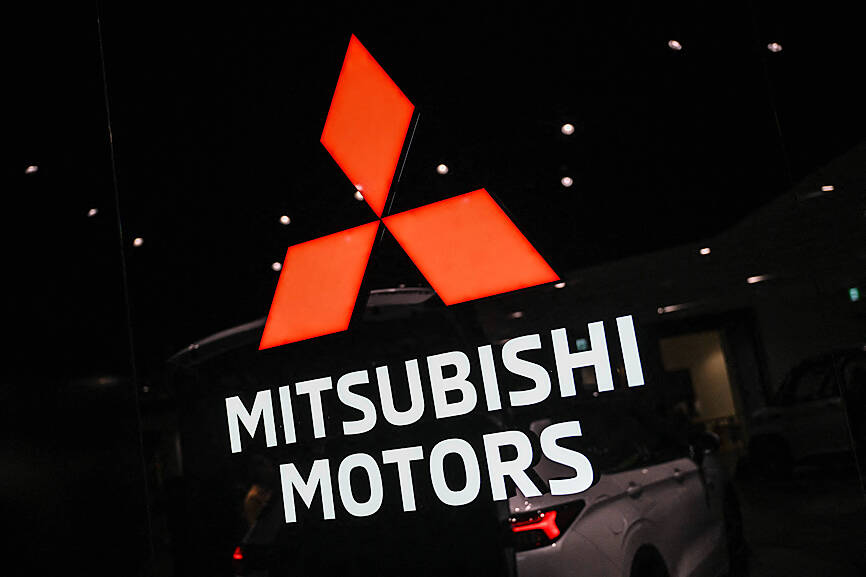Japan’s Mitsubishi Motors Corp is set to join an alliance between Honda Motor Co and Nissan Motor Co, creating an auto group with combined sales of more than 8 million vehicles, the Nikkei business daily said on Sunday.
Mitsubishi Motors, which is 34 percent owned by Nissan, would work with Honda and Nissan to finalize the details of their partnership, but the three firms intend to standardize in-vehicle software that controls cars, Nikkei said.
Mitsubishi Motors declined to comment on the report, while a Nissan spokesperson would only say the report was not based on something either of the companies had announced. Honda did not respond to a request for comment.

Photo: AFP
The push comes as Nissan has been steadily losing market share in its two largest markets, the US and China, which together accounted for half of its global sales in the year to March.
On Thursday, the company cut its annual outlook after heavy discounting in the US almost wiped out its first-quarter profit.
Nissan and Honda said in March that they were considering a strategic partnership to collaborate on producing electric vehicle components and artificial intelligence in automotive software platforms.
Mitsubishi Motors is already part of a long-standing alliance with Nissan and France’s Renault SA that the three automakers last year agreed to restructure, aiming for a more agile partnership.
Separate collaboration between Nissan, Honda and Mitsubishi Motors could help Japan’s automakers cut costs and beef up to battle tough competition in electric vehicles, dominated by companies like BYD Co (比亞迪).

When an apartment comes up for rent in Germany’s big cities, hundreds of prospective tenants often queue down the street to view it, but the acute shortage of affordable housing is getting scant attention ahead of today’s snap general election. “Housing is one of the main problems for people, but nobody talks about it, nobody takes it seriously,” said Andreas Ibel, president of Build Europe, an association representing housing developers. Migration and the sluggish economy top the list of voters’ concerns, but analysts say housing policy fails to break through as returns on investment take time to register, making the

‘SILVER LINING’: Although the news caused TSMC to fall on the local market, an analyst said that as tariffs are not set to go into effect until April, there is still time for negotiations US President Donald Trump on Tuesday said that he would likely impose tariffs on semiconductor, automobile and pharmaceutical imports of about 25 percent, with an announcement coming as soon as April 2 in a move that would represent a dramatic widening of the US leader’s trade war. “I probably will tell you that on April 2, but it’ll be in the neighborhood of 25 percent,” Trump told reporters at his Mar-a-Lago club when asked about his plan for auto tariffs. Asked about similar levies on pharmaceutical drugs and semiconductors, the president said that “it’ll be 25 percent and higher, and it’ll

CHIP BOOM: Revenue for the semiconductor industry is set to reach US$1 trillion by 2032, opening up opportunities for the chip pacakging and testing company, it said ASE Technology Holding Co (日月光投控), the world’s largest provider of outsourced semiconductor assembly and test (OSAT) services, yesterday launched a new advanced manufacturing facility in Penang, Malaysia, aiming to meet growing demand for emerging technologies such as generative artificial intelligence (AI) applications. The US$300 million facility is a critical step in expanding ASE’s global footprint, offering an alternative for customers from the US, Europe, Japan, South Korea and China to assemble and test chips outside of Taiwan amid efforts to diversify supply chains. The plant, the company’s fifth in Malaysia, is part of a strategic expansion plan that would more than triple

Taiwanese artificial intelligence (AI) server makers are expected to make major investments in Texas in May after US President Donald Trump’s first 100 days in office and amid his rising tariff threats, Taiwan Electrical and Electronic Manufacturers’ Association (TEEMA, 台灣電子電機公會) chairman Richard Lee (李詩欽) said yesterday. The association led a delegation of seven AI server manufacturers to Washington, as well as the US states of California, Texas and New Mexico, to discuss land and tax issues, as Taiwanese firms speed up their production plans in the US with many of them seeing Texas as their top option for investment, Lee said. The